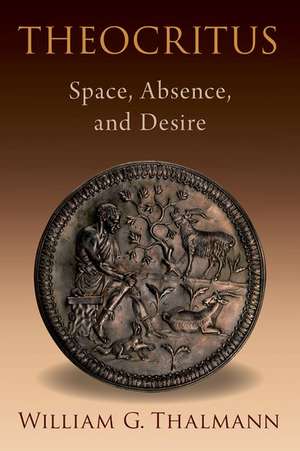Theocritus: Space, Absence, and Desire
Autor William G. Thalmannen Limba Engleză Hardback – 14 mar 2023
Preț: 365.33 lei
Preț vechi: 502.54 lei
-27% Nou
Puncte Express: 548
Preț estimativ în valută:
69.91€ • 73.14$ • 58.07£
69.91€ • 73.14$ • 58.07£
Carte disponibilă
Livrare economică 01-07 martie
Livrare express 26 februarie-04 martie pentru 93.46 lei
Preluare comenzi: 021 569.72.76
Specificații
ISBN-13: 9780197636558
ISBN-10: 0197636551
Pagini: 256
Dimensiuni: 237 x 163 x 21 mm
Greutate: 0.53 kg
Editura: Oxford University Press
Colecția OUP USA
Locul publicării:New York, United States
ISBN-10: 0197636551
Pagini: 256
Dimensiuni: 237 x 163 x 21 mm
Greutate: 0.53 kg
Editura: Oxford University Press
Colecția OUP USA
Locul publicării:New York, United States
Recenzii
Thalmann offers a brilliant reading of the Theocritean corpus through the lens of space and location. Treating both realistic subjects under Ptolemaic rule and imaginary characters dwelling in bucolic space, Thalmann focuses on the dynamic of absence and desire as Theocritus' overarching theme. A pleasure to read!
This is a nuanced discussion of Theocritean bucolic space: how it differs from urban, agricultural, marine, and mythological realms, and the ways in which boundary dynamics inform the texts of the received corpus. A fitting successor to his work on the Argonautica.
Altogether this book is a delight; Thalmann effectively uses the idea of imaginative spaces to illuminate Theocritus' creation of his bucolic world while keeping the focus on the poetry, not the theory. At the same time, he engages contemporary concerns in Hellenistic poetry: the poetry book, engagement with contemporary politics, particularly the Ptolemaic Empire and Alexandrian self-consciousness.
Both scholarly and accessible, the study fills a need for a current book-length treatment of Theocritus and contributes to important themes in Hellenistic poetry more broadly.
[Thalmann] has authored an elegant and sensitive study that repays close engagement. It is a necessary read for anyone seriously interested in the study of Theocritus.
This book surveys the vast majority of Theocritus' bucolic and erotic poems and will deservedly become the definitive work on the varieties of spaces depicted in Theocritus' poetry.
This book surveys the vast majority of Theocritus' bucolic and erotic poems and will deservedly become the definitive work on the varieties of spaces depicted in Theocritus' poetry, in particular the "space of absence" of the absent beloved.
Can humans ever truly fit into nature? This is one of the central questions asked by William G. Thalmann in his book Theocritus: Space, Absence, and Desire. The book treats the Theocritean corpus as a multifaceted whole, covering a range of fictional spaces (from the bucolic to the urban, the mythological to the encomiastic), all coloured by the overarching contextual space of the Ptolemaic empire. But the bucolic Idylls take on particular importance as they raise the question of the relationship of human culture to nature.
This is a nuanced discussion of Theocritean bucolic space: how it differs from urban, agricultural, marine, and mythological realms, and the ways in which boundary dynamics inform the texts of the received corpus. A fitting successor to his work on the Argonautica.
Altogether this book is a delight; Thalmann effectively uses the idea of imaginative spaces to illuminate Theocritus' creation of his bucolic world while keeping the focus on the poetry, not the theory. At the same time, he engages contemporary concerns in Hellenistic poetry: the poetry book, engagement with contemporary politics, particularly the Ptolemaic Empire and Alexandrian self-consciousness.
Both scholarly and accessible, the study fills a need for a current book-length treatment of Theocritus and contributes to important themes in Hellenistic poetry more broadly.
[Thalmann] has authored an elegant and sensitive study that repays close engagement. It is a necessary read for anyone seriously interested in the study of Theocritus.
This book surveys the vast majority of Theocritus' bucolic and erotic poems and will deservedly become the definitive work on the varieties of spaces depicted in Theocritus' poetry.
This book surveys the vast majority of Theocritus' bucolic and erotic poems and will deservedly become the definitive work on the varieties of spaces depicted in Theocritus' poetry, in particular the "space of absence" of the absent beloved.
Can humans ever truly fit into nature? This is one of the central questions asked by William G. Thalmann in his book Theocritus: Space, Absence, and Desire. The book treats the Theocritean corpus as a multifaceted whole, covering a range of fictional spaces (from the bucolic to the urban, the mythological to the encomiastic), all coloured by the overarching contextual space of the Ptolemaic empire. But the bucolic Idylls take on particular importance as they raise the question of the relationship of human culture to nature.
Notă biografică
William G. Thalmann has taught at Yale University, Hobart and William Smith Colleges, and the University of Southern California, where he is now Professor Emeritus of Classics and Comparative Literature. He is the author of five previous books on Greek poetry and a number of articles on ancient literature and ancient slavery.
